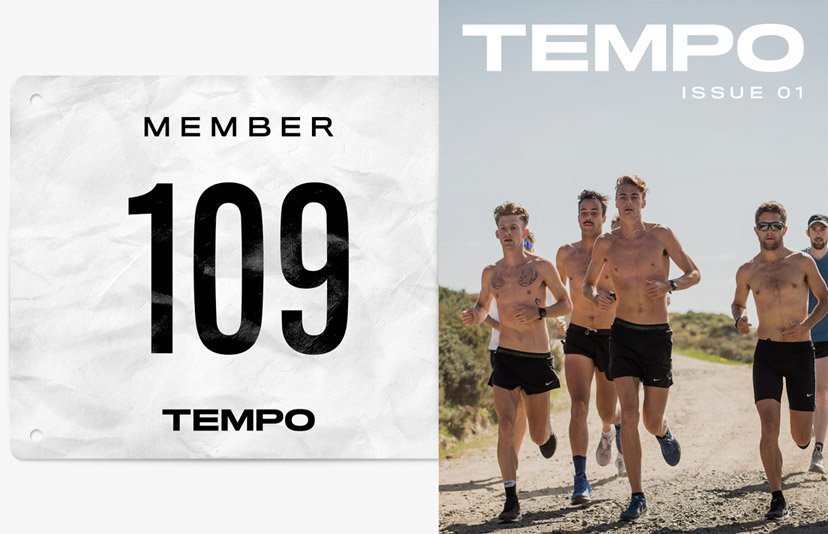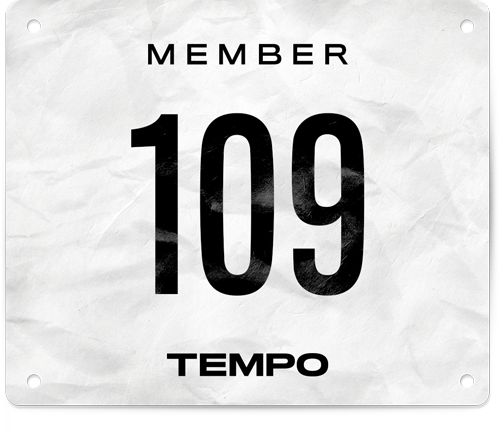Culture
MARATHON TO MILE AND BACK AGAIN
How the track season prepared me for marathon success
Editor’s Note: Leigh Anne Sharek lives and races in New York City, as a member of the Brooklyn Track Club and the Lostboys. If there’s any kind of race going down on the east coast, there’s a good chance Leigh Anne is toeing the line. Keep up to date with her here as a regular TEMPO columnist, and on her Instagram here.
I have an atypical running journey. I grew up running but I never loved it; my mother put me in track when I was young (yes, there are pictures of me in some awesome 90’s track pants). I ran cross country in high school to satisfy a sports requirement but never took it seriously. I didn’t run in college, or in the years afterwards. I came into the sport late and as far as training age goes, I’m a baby, maybe a toddler. One bet made by a friend led to my first 5K, and the spark ignited. I went from a very inconsistent hobby jogger to highly competitive local elite runner in the span of about 5 years. So far I have been very successful at the marathon and half marathon - but I am not satisfied. I want to be faster. So I did things backwards- I went from marathoner to miler. And surprisingly, by taking a step away from marathon training to focus on the mile, I became a much better marathoner.
If you run track in high school or college, choosing a distance to focus on is usually straightforward. You and your coach determine what your strengths are and focus your training to sprinting, middle distance, or distance. But for those of us who didn’t run in school, who found running after those formative years, we are left stranded in a big wide world of races and distances. So I did what everyone does and signed up for a 5K. From the 5K I started to move up the chain- 10K, half marathon, and finally the marathon. Ratcheting up the distances I raced seemed like what I was supposed to do.
In the amateur running community, one's dedication is understood by the number of miles they run in a week. Especially now when everything is shared online: routes, workouts, distance, pace, etc., nothing about training is private - everyone is watching. I was swept up in the competition of high mileage and started adding on and taking less days off. As my runs got longer and more consistent, the more I improved. I PR’d in marathon after marathon, race after race. I was riding a wave of confidence, expecting that during my next marathon I would finally break the 3 hour barrier I had been working towards for years.
But I didn't. And I didn't in the next one either. Or the one after that. So there I sat, crushed, in the Boston Commons, oblivious and indifferent to the shining sun and the hordes of runners and tourists around me. At the most iconic and sought after marathon in the world I had crashed and burned. Again. I felt gutted and depressed. There were tears, maybe (definitely) some wallowing. Mostly there was the thought that I didn’t want to run marathons anymore. I wanted to run faster; I knew I could be faster, but it just wasn’t happening.
I PR’d in marathon after marathon, race after race. I was riding a wave of confidence, expecting that during my next marathon I would finally break the 3 hour barrier I had been working towards for years.
But I didn't.
Months after Boston, I went to watch the 2016 Olympic Trials in Eugene Oregon. I had never been around that much running before, or that caliber of running. These were the best track and field athletes in the country; they had incredible fitness and talent. But what I noticed more was their confidence. Even if they were scared stiff on the inside (which I am sure some of them were), they walked onto the track like they owned it. Because for them, this was second nature. And whether they won or lost, they were celebrated. I hadn’t paid attention to track and field a day in my life, and the next 12 days were spent under the Hayward Field Jumbotron watching athletes lay it all on the line. I learned names, backgrounds, PRs, and I became invested. It was the most competitive and electrifying event I had ever witnessed. Why couldn’t I do that? Here were hundreds of athletes who didn’t measure their running success in marathon times or weekly mileage. I was inspired again.
Whether it’s the mile or the marathon, the goal is to run as fast as possible. And if the goal is to run fast - why not train for a shorter, faster event? Train your body to go even faster than your goal pace.
So that’s what I did - I ran an indoor track season, focusing on the mile. Here was something new; something foreign and challenging. The feeling after finishing an 18 miler and finishing a track workout couldn’t be more different. I’m sure someone can explain the difference in terms of aerobic and anaerobic - but just take my word for it. There is an unmatched satisfaction when that last rep is done and you are completely and utterly exhausted. My legs shake, my arms shake, I can’t stay upright, and it’s totally worth it. The racing I was doing indoors inspired the workouts: the workouts to get better at the mile. And I did get better at the mile. I went from a 5:22 to a 5:09 in the span of a couple months. And if I could do that - why couldn’t I run under 5:00? Why not under 4:50? Where is the ceiling? I was touching paces in workouts I had never considered possible before. But what if these new goals were too hard? Too fast? It was a completely new and scary feeling. I was training different muscles; training differently.
The thing that hooked me on track is that there is something badass about it. It is an intimidating, unforgiving place where athletes go to run fast. You go out hard from the gun, run on the rail, make moves. You ask your body to give so much- literally everything it has, then realize it can give even more. Track races are energized, strategic, and often dramatic. That is what I want to be good at. I want the speed, I want the awareness, I want the competition. I have the guts and want the glory.
There is marathon pain, and there is mile pain. I wasn’t sure if I wanted to experience marathon pain again, but in the end I chose torture, and signed up to run the Chicago Marathon. Unfinished business and all that. A month before the marathon, I ran sub 5 min in the mile for the first time. Turns out, for me at least, improving your leg speed, aka training for the mile- can really improve your marathon. All that work I put into training for the mile paid off big time in Chicago where I PR'd massively. Afterwards I went back to mile training, ran an indoor season, and transitioned to outdoor.
I understand the amateur running community’s commitment to the marathon. I too feel a dedication to the marathon. There is a blatant “bigger is better” way of thinking that implies success in the marathon is the pinnacle of running. It is hard to get away from. I am planning to run California International Marathon in early December. But I love racing, and marathon training is not conducive to that. It is too time consuming; too long run/high mileage dependant. I used to run two marathons a year. Now I only run one in the fall, so I can focus on other distances too. I have been in mile/5K training all summer. I don’t believe it is possible to be in mile shape and marathon shape at the same time. Right now I am in mile shape, and am proud to say I am a 4:50s girl now.
"Track races are energized, strategic, and often dramatic. That is what I want to be good at. I want the speed, I want the awareness, I want the competition.
I have the guts and want the glory".
I have big goals for both 2018 and 2019. I want to run sub 4:50 in the mile this fall. I want to run sub 2:45:00 this winter, and qualify for the Olympic marathon trials. After that I want to focus on shorter stuff again. I want to get better at track events. I would like to get close to a national championship qualifying 10K time. It’s going to be a lot of work- but I am excited.
What started out as a way to get away from the marathon turned into the best thing I could have done to help my marathon training. I, like many others, was in the mindset that higher volume would get me to a better marathon. But that can only take you so far. Transitioning into track workouts changed me physically and mentally. It made me stronger; it gave me an explosiveness I never had before. Track taught me how to race, how to fight, how to kick it in. It showed me that I am tough. I didn’t really know what I was capable of until I started training for and racing the mile. It gave me confidence, and that confidence and speed combined translated into my best marathon season yet. And right now, heading in to another marathon training cycle, I know it’s going to be even better.


